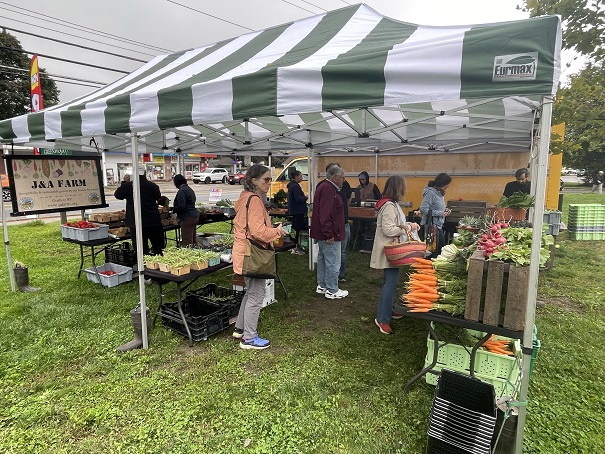By Peter Lyons Hall
According to Fast Food Nation film producer, Eric Schlosser, and author, Michael Pollan, mergers and acquisitions that accelerated during the pandemic “have created food oligopolies that are inefficient, barely regulated and sometimes dangerous,” and among the antidotes to our growing mistrust of the traditional food chain supply network is our willingness to become more familiar with local producers found at farmers markets, like the Lakeside Farmers Market that will begin its next season on Saturday June 8, 2024 at Winstanley Park on Windermere Avenue in the village of Greenwood Lake.
In his articles and films Schlosser reports that the concentration of power in the US food system is staggering: four of the largest beef companies control 90% of the market; only a handful of companies control the breakfast cereal market; and three companies control most of the coffee consumed in the US. This creates higher prices because there is less choice to consumers, since these companies can dictate both the wages and the prices they pay to their suppliers – the farmers, ranchers and other producers. “In the last 40 years,” remarked Schlosser, “there has been a steady decline in the number of farms and a concentration of power among the middle men who control the market. This has had a devastating effect upon local farms throughout the countryside.
A recent study announced by Penn State University focusing on farmer suicides summarized data from 40 states from 2003 to 2018. The analysis included farmers, ranchers, and agricultural managers within crop and animal production, now found in the top ten of suicide rates in the US. The results indicated that more than 90% of the total 1935 deaths corresponded to males, which is expected because it reflects the current condition of the agricultural workforce. Recently, ThePacker.com hosted a podcast entitled “Why there’s a need to talk about farmers’ mental health,” with featured guest and local farmer, Chris Pawelski.
An FTC report issued in March 2024 revealed that a handful of companies exert enormous influence upon the market resulting in the following conclusions:
Large purchasers sought favorable supplier allocations: Some companies, most often larger ones, re-imposed strict delivery requirements on their upstream suppliers during the height of the pandemic and threatened fines for noncompliance, pressuring suppliers to favor them over rivals.
- Grocery retailer profits rose & remain elevated: Food and beverage retailer revenues increased to more than 6% over total costs in 2021, higher than their most recent peak in 2015 of 5.6%. In the first three-quarters of 2023, retailer profits rose even more, with revenue reaching 7% over total costs, casting doubt on the assertions of some companies that rising prices at the grocery store are the result of retailers’ own rising costs.
- Excessive consolidation recognized as a liability: During the pandemic, some retailers sought to diversify their supplier base, particularly of private label goods, as firms recognized the risks associated with having few suppliers available. Some firms buying goods in markets with few suppliers even began exploring whether to build or acquire manufacturing capacity to reduce their exposure to concentrated markets.
Farmers markets provide one of the only low-barrier entry points for beginning farmers, allowing them to start small, test the market, and grow their businesses. And growers selling locally create 13 full time farm operator jobs per $1 million in revenue earned. Several studies have found lower prices for conventional and organic produce at farmers markets than at supermarkets.
Writing for HopkinsMedicine.org food expert, Melinda E. Cater, MS, RD, LDN noted that “Produce from local farmers has spent more time on the vine, on the tree or in the ground, so you get better taste and more nutrients. And when it comes to fresh fruit and vegetables, the shorter the time and distance from farm to sale, the higher the levels of vitamins and minerals.” Farmers market vendors educate their shoppers. Four out of five farmers selling at markets discuss farming practices with their customers, and three in five discuss nutrition and how to prepare food. Most produce travels at least 1,500 miles before reaching the produce section of grocery stores in the US, attempting to ripen during the journey. “There is no comparison to the flavor you can get directly from a local farm,” remarked Jeff Bialas, of J&A Farm. “Without having to spend time traveling in special packaging, local fruits and vegetables can offer consumers a terrific economic and nutritional benefit.”
This season the full time vendors exhibiting each Saturday at the Lakeside Farmers Market, from 9AM-1PM will include J&A Farms, Locust Grove Fruit Farm, Hillery Farms/Peg’s Eggs/Lowland Farms (who will also be providing poultry, beef, lamb, and pork), The Original Laker Baker, Hoffman Bread, The Flower and Dough, Unique Creations, NASA/Master Gardener Jim Hall, as well as part time vendors, Hudson Valley Pantry and Flower Cakes by Nadine. To learn more about the Lakeside Farmers Market, click on https://www.villageofgreenwoodlake.org/lakeside-farmers-market/.






